|
Power struggle in
'democratic' Myanmar
By Larry Jagan
BANGKOK - The trappings of the old military regime that ruled Myanmar
are slowly fading from view under new democratically elected president
Thein Sein and his promises of reform. At the same time, a budding
power struggle between the president and vice president Thin Aung Myint
Oo has pitted moderate versus hardline agendas and stalled
significantly the new government's economic and political progress.
Thein Sein, who served as prime minister for four years in the outgoing
military junta, faces what many view as a pre-ordained challenge to his
democratic mandate. According to some government insiders, Thin Aung
Myint Oo has deliberately tried to
undermine the new president, including by asserting his influence over
the new army chief. As a result the president's planned economic
reforms and debate over whether to release over 2,200 political
prisoners have already been put on hold.
Thin Aung Myint Oo represents the old military guard and their
hard-line attitudes towards political change. As former junta leader
Than Shwe has withdrawn from the scene, some believe he deliberately
left a power vacuum in his wake which Thein Sein and Thin Aung Myint Oo
are competing to fill. If the competition escalates into open rifts,
some fear the military could step in to suspend the country's nascent
democracy.
To complicate matters, the top leaders of the Union Solidarity and
Development Party (USDP) - the military-linked ruling party in
parliament - are also trying to assert influence. These top party
officials, who were persuaded to resign or retire from the army ahead
of last November's election, no longer have their military stripes.
Many are from the older generation of military ministers who remain
suspicious of the country's move from military to democratic rule.
Although Than Shwe may have formally retired from the country's
political scene, seen in the removal of his once ubiquitous portraits
hung in official buildings, his legacy is playing havoc with Thein
Sein's room to maneuver. In an effort to ensure that no strong military
leader emerged to take control of the country and endanger his and his
family's authority and wealth, Than Shwe is believed to have
deliberately left a vacuum in his wake.
Thein Sein is committed to introducing moderate democratic and more
ambitious economic reforms, according to sources close to him.
"The old military regime has gone," said a former senior
Myanmar diplomat who wanted to remain anonymous. "The new
government really wants to introduce positive change," he said.
This optimistic view has been echoed by many Myanmar government
officials, including diplomats posted in Asia and Europe. Thein Sein's
speech in March when he took over as the country's top leader and made
calls for a move towards democratic governance is indicative of his
vision, they said.
But with a new pluralist power structure, comprised of executive,
legislature and army branches, there is substantial scope for spoiling
activities. Analysts believe that Thin Aung Myint Oo, the former head
of an influential trade council, is playing that role, exploiting
opportunities to usurp the president's authority and subvert his
agenda.
After cabinet meetings, which usually take place once a week, the
ministers are summoned into his room without Then Sein for tea and an
ear bashing, according to people familiar with the situation. In
particular, he has bid to exert influence over key economic decisions,
including authority over potentially lucrative import and export
licenses and company registrations.
In one telling episode, Thein Sein ordered that excise duties on
exports be reduced to 5%. Later Thin Aung Myint Oo intervened with the
support of the finance minister to put the rate at 7%. The vice
president also unilaterally cut the budgets of line ministries by
between 20% to 40%, apart from the defense portfolio.
Thin Aung Myint Oo has also strained the new government's international
credibility by telling visitors to the capital, including a recent
European Union delegation and influential US Senator John McCain, that
the country holds no political prisoners. International human rights
groups contend that the regime holds over 2,200 political prisoners
behind bars. Internal debate over the issue has reportedly been
stonewalled by the vice president.
New marching orders
The most critical tussle will concern the once dominant military's
future role in politics. The 2008 constitution guaranteed military
members 25% of the total seats in parliament. New army chief General
Min Aung Hlaing has downplayed the military's political role and
soldier MPs in both national houses of parliament were virtually silent
during discussions in parliament's first session held earlier this
year.
Min Aung Hlaing told military MPs before parliament was convened that
their political duty was to rebuild the reputation of the army: It's
your duty to become seasoned politicians, he reportedly said, as you
represent the future Myanmar. He virtually blamed the old guard for the
country's current economic and political mess, according to one
military MP.
Thin Aung Myint Oo is reportedly unhappy with this limited role for the
armed forces and has maintained they should exert pressure on both the
executive and legislature. Several weeks ago Thin Aung Myint Oo
reportedly summoned the army chief to his office and lectured him on
the new power structure, emphasizing that he was his boss as militarily
he out-ranked Thein Sein.
Die-hards in the USDP, many forced to resign from the military to
contest electoral seats as civilians, are already expressing
frustrations about being sidelined by the current government and
parliament. They are also now working behind the scenes to reassert their
lost influence through connections to the old regime.
In particular, they are reportedly trying to encourage Than Shwe to
establish and lead a new State Supreme Council to oversee the new power
structure, as outlined and allowed for by the new charter. USDP leaders
Aung Thaung and Htay Oo have reportedly urged the former leader to
consider a senior advisory role similar to the ones China's Deng
Xiaoping and Singapore's Lee Kuan Yew played after they stepped down
from their respective countries' formal leadership positions.
Some analysts believe that Than Shwe still runs the country from behind
the scenes, evidenced in his frequent meetings with MPs at his personal
residence in Naypyidaw. "Than Shwe has no plan to switch state
power to the president or parliament," said Aung Lynn Htut, a
former Myanmar military intelligence officer and diplomat who defected
after he was posted to Washington. "He will continue to control
things from behind the curtain," he said.
For the moment, these layers of political intrigue are dogging
Myanmar's movement forward as a guided democracy. Thein Sein appears to
have at least one strong ally in the parliamentary speaker Thura Shwe
Mann, the junta's former No 3. It is in his interest to ensure
parliament functions effectively within the new political structure. He
is also a known rival of Thin Aung Myint Oo, especially in economic
matters.
Myanmar's political future will hang in the balance until this power
struggle is resolved. While Thein Sein presents a new way forward, Thin
Aung Myint Oo represents the front line of defense for the status quo.
While each pushes their conflicting agendas, the military waits in the
wings and the potential for a coup in the name of restoring stability
and suspending democracy can not for now be ruled out.
Larry Jagan previously covered Myanmar politics for
the British Broadcasting Corporation. He is currently a freelance
journalist based in Bangkok.
(Copyright 2011 Asia Times Online (Holdings) Ltd. All rights reserved.
Please contact us about sales, syndication and republishing.)
|





















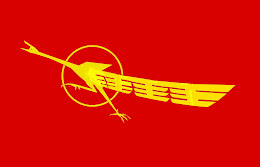





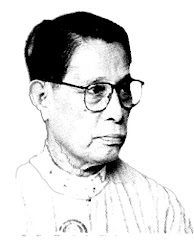


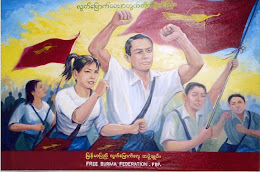





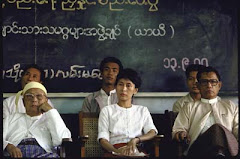

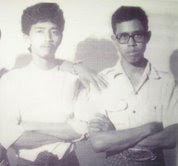

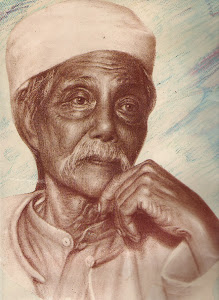
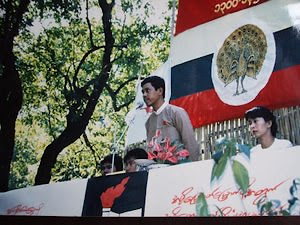
4 comments :
ဘာသာျပန္ေပးၾကပါလားလုိ႔ ...
good news if it will happen!!!!!!!!!!
bad news if it is only fake!!!!!!!!
http://www.maukkha.org/index.php?option=com_content&view=article&id=1539:2011-07-09-05-26-16&catid=library-&Itemid=272
MIND OUR OWN DUTY!!!!!!!!!
သားသားက အီး မဖတ္တတ္လို. ဘာသာျပန္ေပးပါခင္ဗ်
Post a Comment